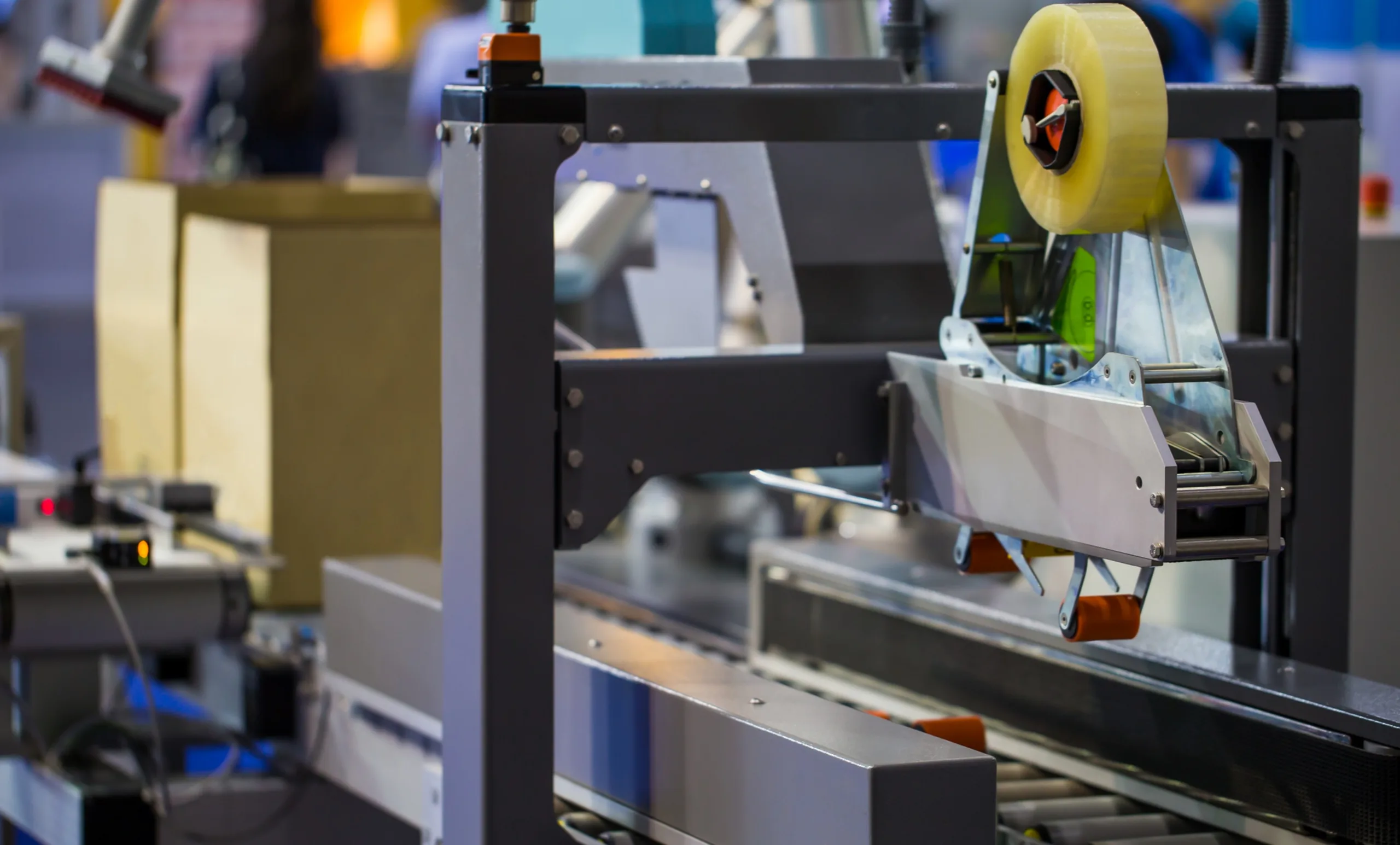Using Automation to Speed Up Case Sealing

The speed of packing and shipping your goods is an important factor in meeting customer expectations for order fulfilment. Efficient packaging can be key to achieving this!
The act of sealing parcels is often one of the most time-consuming parts of the packaging process. Therefore, automation can help to transform the way businesses approach this essential task. Using case sealers or gummed paper tape dispensers can quickly improve productivity. It doesn’t have to break the bank either – there are options for a range of budgets.
In this blog, we will discuss case sealing and case sealing automation. We will talk about why it is important, the various types of equipment, and how it can affect your packing process.
- 1.
- 2.
- 3.
- 4.

Understanding Carton Sealing
Using tape to close a box is a simple part of packing, but it can be more complex than you think. The complexity of case sealing can vary depending on the type, amount and mode of application of the tape. This is especially true when done manually.
Sealing a cardboard box can consume 60% of your overall packing time. Therefore, it’s a great area to review when you need to increase your productivity.
The Importance of Carton Sealing
Sealing is an important and time-consuming part of packing. It can also impact your pack security, costs and packaging waste if you’re not sealing the boxes effectively.
Too much tape, and you’re wasting packaging, increasing cost and often, producing an unsightly parcel. Not enough tape and you risk your parcel opening during shipping, leading to poor customer experience.
The type of adhesive you use for sealing is important too. For example, if you’re shipping in freezing conditions, you’d need to use an adhesive suitable for that. Some adhesives won’t work if they’re too cold!
The packing process can influence many of these important factors. Using automation can help you control costs, effective application and the amount of material used. Paired with the right tape and you’ve got a recipe for sealing success.
Different Types of Automatic Case Sealers & Tape Dispensers
Automatic tape dispensers and case sealers (also called carton sealers) can dispense and apply pre-set lengths of tape. They reduce packaging waste and significantly speed-up packing. Some automatic case sealers also use glue rather than tape.
Here are the common types of carton-sealing automation:
- Electronic gummed paper tape dispensers – available as tabletop or portable dispensers, these machines dispense pre-set lengths of gummed paper tape. They’re often a good first step in sealing automation, as they’re relatively low-cost. The below video shows the Grip Taper: a portable gummed-paper tape dispenser.
- Self-adhesive tape case sealers – these machines will automatically seal your boxes using lengths of tape. Standard case sealers are usually pre-set to work with a specific size box or case format.
- Hot melt glue case sealers – working on the same principle as a self-adhesive tape case sealer that uses tape, this type of carton sealing equipment uses molten glue to seal boxes.
- Random case sealers – random case sealers can seal different sizes boxes and formats. They can use tape or glue as the sealing material. They’re suitable for operations where many different sizes and shapes of products are being packed. Here’s a video of a random case sealing machine that uses tape to seal the cartons.
How to Choose the Right Carton Sealing Equipment for Your Business
The carton sealing equipment you choose will depend on lots of factors. You should think about what you’re packing as well as your storage and shipping conditions. Your production goals, budget and warehouse space will also be important considerations too.
For smaller operations, gummed paper tape dispensers are a good first step. If you’re packing a higher volume of boxes, pre-set case sealers would be the logical next step. For high-capacity production lines with a range of pack sizes, random case sealers are an ideal choice.
Carton sealers and tape dispensers can be added to your packing line along with other automation like a case erector.
Ultimately, it’s worth taking advice from packaging automation experts. You can often get a recommendation that’s specific to your business.

How Automation Can Speed Up Case Sealing and Benefit Businesses
Speeding up carton-taping can be a big productivity win. Using a case sealing machine or automatic tape dispenser can be key to doing this. Let’s explore the benefits of automating your sealing process:
How Automatic Case Sealers Can Improve Productivity
Automatic case sealers streamline the packing process. They drastically improve productivity with consistent, reliable results.
An automatic case sealer will automatically fold the top flaps on a box, dispense tape or glue and consistently seal it every time. This not only improves overall productivity but also frees up manpower for more complex tasks.
Cost-Saving Benefits of Efficient Carton Sealing
Investing in automation may seem expensive at first, but the long-term advantages are worth the initial investment. Plus, there are lower-cost options like gummed paper tape dispensers that can work for smaller budgets.
In terms of cost-saving benefits of using a case sealer or electronic dispenser, key advantages are:
- Lower material costs – save money on tape by using the right amount of material each time, allowing you to monitor and control your spending on tape.
- Labour cost-savings – as the packing time is much quicker, your operators can manage increased throughput. You can also reduce the need for temporary staff during peak periods.
- Reduced damages and returns – secure, consistent sealing can reduce damages and returns. In turn, this lowers waste and costs associated with this process.
Investing in Carton Sealing Equipment: ROI and Benefits
Automating sealing using a case sealer or electronic dispenser saves money in so many ways. Because of this, the investment can often pay off in months rather than years.
To determine the ROI of sealing automation, consider both the machine’s upfront cost and the long-term savings it provides.

FAQs: Answering Your Carton Sealing Queries
What Are the Different Methods of Carton Sealing?
Lots of ways to seal a carton exist. The most common way is using self-adhesive tape and a manual tape dispenser.
Other ways include semi-automatic and fully automatic processes, such as gummed paper tape dispensers and the previously mentioned case sealers.
What Is a Carton Sealer?
A carton sealer is a machine designed to automate the process of sealing cartons or boxes. Also known as case sealers, they either apply tape or glue to a box to seal it.
There are various types of carton sealers, like random case sealers that can seal different sizes and formats of boxes.
How Does an Automatic Carton Sealer Work?
Automatic Carton sealers work by automatically folding the top flaps of a carton, applying adhesive materials such as tape or glue, and securely sealing the box. The process varies depending on the type of carton sealer, with manual, semi-automatic, and fully automatic options available.

Summary
There are sealing automation solutions to suit every size of business. Whether you are looking for an integrated system for high volume shipments, or a semi-automatic solution to fit into a fledging packing operation.
Introducing a case sealer or electronic tape dispenser can help you significantly speed up carton sealing, saving you time and money.
When you have the right carton sealing solution, you can enhance productivity, reduce costs and ultimately deliver an improved customer experience.
To help make the right choice for business, get in touch with one of our packing automation experts today.
